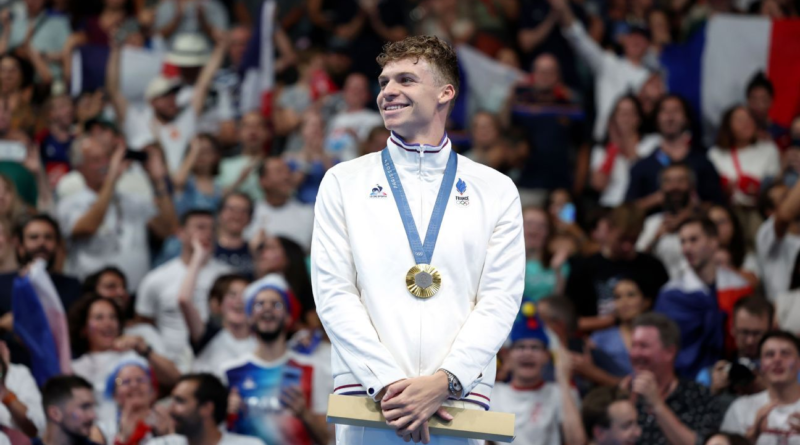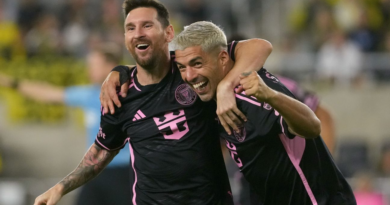'A dream come true': France's Leon Marchand delivering as the new king of Olympic swimming
PARIS — Léon Marchand stood atop the podium Wednesday night and looked sheepishly around La Defense Arena, where thousands of fans sang — or, more accurately, yelled in key — along to every word of “La Marseillaise,” the French national anthem.
While he appeared to be a mixture of amused and in disbelief, he later admitted he was shy and didn’t love being the center of attention. But he sang along too, and smiled widely when it was over.
And then he took a brief victory lap around the arena before heading out of sight.
But it wasn’t because he wanted to escape the sudden glare. He simply had another race for which to prepare.
After winning the 200-meter butterfly following an incredible late-race comeback to become the first French swimmer in history to win multiple individual gold medals at one Games, Marchand had less than 50 minutes from the time he collected his medal until he needed to be on the starting block for the 200m breaststroke final. No swimmer had ever won an Olympic medal in both the butterfly and the breaststroke — let alone on the same night — and Marchand had been aiming to achieve the seemingly impossible.
With the crowd chanting in unison every time he pushed through the water to take a breath, he showed no signs of fatigue or pressure. The 22-year-old Marchand won the race and set an Olympic record with his time of 2:05.85. After reaching toward the wall, then looking up to the videoboard to confirm his time, Marchand splashed a fist into the water in celebration.
Marchand had been touted as perhaps the face of the Games during the lead up to Paris, and many believed he could be France’s best hope for multiple medals and even hyped as the next Michael Phelps after breaking the latter’s long-standing 400m individual medley world record in 2023. Five days into the 2024 Olympic Games, Marchand has lived up to every expectation — and more — with three gold medals. Each victory, and each roar from the adoring French crowd, has felt increasingly more like a coronation of the sport’s new king.
Marchand called Wednesday night “indescribable” in an Instagram post and said his first victory Sunday night in the 400m IM was “a dream come true.” But it’s also simply the next step for Marchand, who has used Phelps as a blueprint for his career, in his journey to be the best he can be — and something he had been working diligently toward for three years.
“It feels like destiny being fulfilled,” Herbie Behm, who began coaching Marchand at Arizona State in 2021, told ESPN this week. “In a way, [these results] have been kind of expected and what we even talked about during the recruiting process. He knew he could be the face of the Paris Olympics and we told him we were going to do everything we could to get him there. But not everything always goes the way you hope, and he still had to put in the work.
“To see him deliver has been incredible.”
AFTER FINISHING IN sixth place in the 400m IM in his Olympic debut in Tokyo, Marchand took his talents to Tempe. With that laser-sharp focus on the 2024 Games in his home country, he had chosen the school primarily to be able to work with then-head coach Bob Bowman, who had previously worked with Phelps.
Both of his parents are former Olympic swimmers, and his father, Xavier, even competed against Phelps. The family had made it clear they wanted to follow the U.S. legend’s path as much as possible. But that certainly wasn’t the first time a swimmer had wanted to do that, and hopes and reality are not always aligned.
Behm, now the head coach, was an assistant for the team when Marchand arrived on campus. He knew Marchand had potential and was going to be good, but reaching the top of an Olympic podium seemed like “a long shot.”
That is, until the first day of practice.
Or, more specifically, the first 10 seconds of the first practice.
“We just watched him get in [the pool] and we watched him kick underwater, and it felt like we had just hit the jackpot,” Behm said. “Watching the first time he pushed off the wall, just how he kicks, how he moves. It’s like, ‘Wow, this kid is so good.’ We knew he was going to be the best short-course [the 25-yard length pool used for collegiate competitions] swimmer of all time.”
By the end of that first day, Behm remained stunned by the efficiency of Marchand’s kick, but quickly became equally impressed by his tireless work ethic and his “insane endurance and speed.” And it didn’t take Marchand long to show that to the rest of the college swimming world, either. By the end of his freshman season, he had won four titles at the Pac-12 championships and became the NCAA champion in the 200 IM and 200 breaststroke, as well as lifting the Sun Devils to a sixth-place finish — their best result since 1982.
“After the first season, I think it was clear to everyone: This kid is the real deal,” Behm noted.
And despite Marchand’s ultimate goal for Olympic glory and having spent most of his life training as an individual, like most European swimmers do, he quickly bought into being part of the team and its unofficial motto: “How you do anything is how you do everything.” He bonded with his teammates, volunteered to do any race that could earn the team points during meets — no matter how tired it might make him for his best races — and stayed at or near a 4.0 grade-point average almost every semester as a computer science major.
By the end of his third and final year at ASU — he turned professional this spring after his junior season — he was one of the most decorated NCAA swimmers in history. Competing in a variety of races, strokes and distances, he won 10 NCAA titles and 17 Pac-12 titles, broke numerous collegiate and school records and even led Arizona State to its first NCAA team championship in April. Not to mention, he earned a combined five gold medals at the 2022 and 2023 world championships and broke the Phelps record in the 400 IM.
His dreams of Olympic gold continued to become more in focus with every new piece of hardware he attained.
But, according to Behm, Marchand applies the same level of intensity to everything he does. Even during his final semester, knowing he was just months away from potential global superstardom and would not be returning for his senior year, he took 18 academic credits. As unexpected as it might sound, it’s that mentality that Behm partially credits for Marchand’s current success.
“You can’t be unfocused in class, then show up to practice and be crazy focused, and then not study or not really care when you go to sleep or what you eat; everything has to be equally regimented,” Behm said. “When you’re trying to raise the bar for yourself, it has to be in everything you do. … Now Léon has a different challenge with media obligations and things like that which take his attention away from swimming. But in a way, that helps him because he knows to only focus on the task in front of him and he’s trained his nervous system to always be in the present moment.
“So when it’s time to stand up on the blocks and race, he’s right there, in the moment, rather than being a couple of steps ahead and thinking what happens next.”
And competing in college — and learning to swim whatever event was needed — is also a large part of the reason Marchand believes he was able to appear in multiple finals in the same night.
“There was actually almost two hours between races,” Marchand said Wednesday. “I’ve done way more difficult I think in the NCAA season.”
MARCHAND MIGHT BE SHY, but he’s everywhere in Paris. His image can be spotted throughout the city and in advertisements for Louis Vuitton and Omega — with the latter campaign featuring him alongside Phelps. He’s on the front page of the local newspapers and leading French websites and broadcasts.
Bowman is with Marchand as a member of the French coaching staff, and one of the first things the coach did once they arrived in Paris was scope out alternative exits from the arena to protect Marchand from the mobs of fans he expected would be waiting for him — something he had learned from his years with Phelps.
“He has an idea [of how suffocating it will be],” Bowman told The Washington Post before competition began. “But until you live through it, you don’t really have an idea.”
While swimming is always one of the most popular Olympic events, the nights in which Marchand has been competing have been some of the most coveted tickets of the Games. On Sunday, during his first chance to medal in the 400 IM, it felt more like a World Cup crowd than one for swimming. French flags were everywhere, there were impromptu chants and songs, a synchronized “Allez! Allez!” for every stroke during the breaststroke lap, and a near-deafening roar once he touched the wall.
“The U.S. trials were held in a football stadium and there were a lot of people there and it was pretty loud, but not as loud as that was,” American Carson Foster, who won the bronze in the race, said afterward. “It was super cool. Everyone knows they’re cheering for Léon and rightfully so, but it was an awesome experience and an honor to swim next to him in his home country, home Olympics.”
0:50
Léon Marchand wins gold for France in 400-meter IM
Léon Marchand earns first career Olympic gold medal in 400-meter individual medley.
When Marchand climbed out of the pool, using his starting block to pull himself out instead of swimming to the side, he raised his arms in victory as the crowd showered him in an ovation. As Behm proudly noted, James Don, Arizona State’s team manager and Marchand’s former roommate, jumped over the fence separating the fans from the competition floor to be one of the first to give him a hug.
Moments later, French President Emmanuel Macron called him with congratulations.
“He told me that he was watching the final with his whole family and everyone was screaming on the phone,” Marchand said about their conversation. “It was kind of funny.”
During the medal ceremony, the crowd chanted “Lé-on, Lé-on” and then collectively sang the national anthem as it played over the loudspeaker. As Marchand walked around the arena, with his first Olympic gold medal around his neck, even team officials from other countries could be spotted filming him on their phones, as if to capture a moment that might ultimately be viewed as the official start of a new era.
On Wednesday, it was more of the same during both races and both medal ceremonies. Marchand said the crowd gave him energy and despite his natural aversion to attention, he found himself surging because of it.
“I wasn’t ignoring it,” Marchand said. “I was really trying to listen what was happening during the 200 fly. The 200 fly was actually crazy on the last 50 [meters] because I was coming back on Kristof [Milak] and I could hear the crowd just going crazy. I think that’s why also I was able to win that race, really use that energy from the crowd. And the [breaststroke] was also the same because every time I take a breath I can hear this huge noise for me, so it’s pretty cool.”
Marchand still has two more chances to add to his medal haul — in the 200m IM on Friday, and as part of the French 4x100m medley relay team Sunday, the final day of competition. Even with all of the individual glory, Behm believes a relay medal would be a particular source of pride for Marchand.
And it would give him an opportunity to conclude his historic Games just like Phelps did in 2008 as he led the U.S. team to gold and broke the world record.
“I think [Marchand] believes relay medals are worth more than individual medals,” Behm said. “That’s just the way most people think in the NCAA system. For him to be able to help bring a medal, especially a gold, to three other guys would be the coolest thing for him.
“And I know that 2008 relay is burned into his mind. So if it’s a chance to do that for France, then yeah, he’s going to do it. He’s very aware of the history.”



